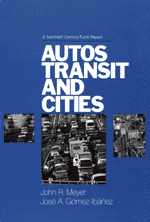Autos, Transit, and Cities
 Urban transportation problems have frequently been touched upon in the many urban policy studies sponsored by the Twentieth Century Fund. But it was not until José A. Gómez-Ibáñez and John R. Meyer submitted a proposal for a thorough assessment of urban transportation policies, that the Fund was presented with an opportunity to sponsor and supervise a project that focused directly on the role of transportation in our cities.
Urban transportation problems have frequently been touched upon in the many urban policy studies sponsored by the Twentieth Century Fund. But it was not until José A. Gómez-Ibáñez and John R. Meyer submitted a proposal for a thorough assessment of urban transportation policies, that the Fund was presented with an opportunity to sponsor and supervise a project that focused directly on the role of transportation in our cities.
This study provides fresh and compelling documentation of the pervasive role of the automobile. Despite the energy crisis, and despite the loss of the competitive edge once held by the American automobile industry—which pioneered in mass production and which has had so great an economic, social, and cultural influence on our society—Americans continue to rely, perhaps excessively, on the automobile. Certainly, our attachment to the automobile has been accompanied by multiple problems for our cities—street and highway congestion, high levels of gas consumption that have contributed to air pollution and affected our balance of payments, and high accident and casualty rates that have increased insurance premiums and resulted in tragedy for those involved. The public policy response to these and other problems—which has involved billions in expenditures—has been either ineffective or inadequate.
It is the thesis of Gómez-Ibáñez and Meyer that the automobile will remain the nation’s dominant form of urban transportation and that transportation programs that fail to assume—and accept—its continued significance cannot work. Their own policy recommendations are directed at taming and containing the automobile and its role, in part by redesigning and reengineering the automobile itself. They also consider the options available in the form of mass transit facilities and other, more modest, arrangements. But they make a strong case that critical attention must be paid to civilizing the automobile. This solution may itself seem tame or pedestrian. In reality, though, it may be the beginning of wisdom for getting out of the transportation mess. (excerpts from Foreword)
Harvard University Press